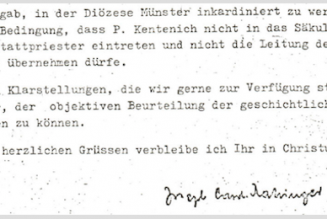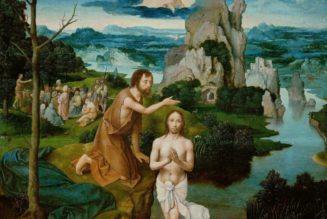
Within the first stanza of the “Our Father,” we encounter a series of directives that I argue tend to be dismissed just like the yield sign on a major highway. The first directive calls us to respect His name as “Abba-Father.” God is our Father; simply put, there is no other. The second directive reminds us that there is only one Kingdom, Heaven, not to be confused with what some individuals would prefer to live in an earthly kingdom. The last directive is probably the most challenging to the sins of avarice, envy, hubris, and idolatry; “thy will be done.”
All three directives reveal the importance of fulfilling an obligation to God. At the moment of our initiation into the Kingdom of God through the grace of baptism, we are marked with the obligation to know, love, and serve Him borrowing from the traditional model of the Baltimore Catechism of our Christian responsibility. Unfortunately, our obligation to adhere to these directives may be thwarted by our inclination to dismiss anything that forces us to love God above ourselves. The fear of surrendering to the will of God is an act of faith that proves difficult for some to overcome.
I Want to know you, Lord.
Suppose we possess an internal disposition for you and me to know, love, and serve God. If this is the case, then our disposition is centered on our willingness to explore who God is, how our understanding of our place in this world fits with a belief in God and whether we have enough trust and curiosity to seek a loving relationship with him. The great Doctor of the Church, St. Anselm, describes this journey in the following way:
O God, let me know you and love you so that I may find my joy in you; and if I cannot do so fully in this life, let me at least make some progress every day until at last that knowledge, love and joy come to me in all their plenitude. While I am here on earth, let me learn to know you better so that in heaven I may know you fully; let my love for you grow deeper here, so that there I may love you fully. On earth then, I shall have great joy in hope, and in heaven complete joy in the fulfillment of my hope.[1]
St. Anslem provides a spiritual blueprint on how to seek God’s love for us and reciprocate that love to him. The Catechism reminds us that everyone is called to enter the Kingdom of God; all you must do is trustfully and obediently accept Jesus as your Lord and Savior.[2] And this is precisely what I argue is needed with the entire spiritual drama of our kerygmatic approach to the unbeliever, the dissonant, or the disillusioned, the introduction to the visible reality of Jesus’ love for us and the opportunity to return that love to him.
Let me tell you about this man named Jesus
What strikes the curiosity of an unbeliever, whether he has walked away from faith in Christ or never had faith in Jesus from the beginning, is the how and why of Jesus. How can someone willingly offer himself in death for people who lied, cheated, disobeyed, and betrayed him, all for what? Second, why would anyone want to follow this person’s apparent failed attempt at establishing a religion whose members failed to fully embrace who he claimed to be as the Son of God?
This is where we must teach from the head to the heart, where the focus is to teach about the man named Jesus, who he was, what he did, and why he did it to save the souls of the lost, destroy the works of the Devil, and provide us with an eternal home that is much more beautiful than anything you can experience or imagine on earth. Jesus was someone’s son; his mother was Mary, who, if you can imagine, was conceived without original sin; his father, a carpenter who was not his biological father but still freely chose to accept him as his own through the urging of one of God’s angelic messengers.
Jesus was both man and God, human and divine. He chose to love those around him, knowing they would betray and eventually murder him for claiming to be God the Son. Jesus chose to die out of love for us and the salvation of our souls. This is the man I would like to speak to you about for a few minutes, if you do not mind.
We must be cautious when introducing a program, an apostolate, or a personally misguided synod that actively chooses to dismiss Jesus Christ as the main subject. The person we encounter must know that he was made for Him.
Do not be conformed to this world but be transformed by the renewal of your mind, that you may prove what is the will of God, what is good, acceptable and perfect.
Rom 12:2
[1] From the Proslogion of St. Anselm








